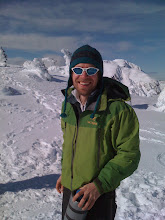skip to main |
skip to sidebar
 That shrinking of the sea ice turned into a big story. The Anchorage Daily News had this story about how the lack of ice is affecting walrus (and the people hunting them), and my paper ran this follow up by the AP.
That shrinking of the sea ice turned into a big story. The Anchorage Daily News had this story about how the lack of ice is affecting walrus (and the people hunting them), and my paper ran this follow up by the AP.
Also, I seem to be on the renewable energy beat lately, covering new projects at the Cold Climate Housing Research Center in Fairbanks and the Chena Hot Springs Resort outside the city.
Anyway, I'm taking a bit of a break, for trips up the Dalton Highway, for instance (shown here).
The blog will be back at some point.
Thanks for reading.
Scientists are expecting arctic sea ice to shrink more this year than in any year since they started recording nearly 30 years ago, according to a story today in the NY Times.William L. Chapman, who monitors the region at the University of Illinois Urbana-Champaign and posted a Web report on the ice retreat yesterday, said that only an abrupt change in conditions could prevent far more melting before the 24-hour sun of the boreal summer set in September. “The melting rate during June and July this year was simply incredible,” Mr. Chapman said. “And then you’ve got this exposed black ocean soaking up sunlight and you wonder what, if anything, could cause it to reverse course.”
Ted Stevens is in the news for other stuff these days, but last week he introduced a resolution relating to climate change. The resolution calls for the development of an international framework to manage arctic fisheries created through fish migrations into warming waters and/or easier boat access in newly ice-free waters.
Here's from a news release.
“Although there is much to learn about climate change patterns, the Arctic Ocean and its fish habitats are changing,” Senator Stevens said. “Fish stocks may colonize this ocean in the coming years, and we need to act now to put appropriate international fisheries agreements in place."
Wow. Click here to see the whole release.
 OK, I'm back now from a crazy weekend of fishing, trekking, and driving.
OK, I'm back now from a crazy weekend of fishing, trekking, and driving.
NPR keeps doing its stories from around the world, the latest one on the physiological value of the midday siesta. On another scale completely is this story on the potential for massive global changes under a warming climate, like earthquakes and volcanic eruptions.
Eruptions of Pavlof volcano in Alaska, for example, tend to occur during the winter months when, for meteorological reasons, the regional sea level is barely 30cm (12in) higher than during the summer. If other volcanic systems are similarly sensitive then we could be faced with an escalating burst of volcanic activity as anthropogenic climate change drives sea levels ever upwards.
Seems a little on the speculative side, but a good read anyway. The picture is of Augustine Volcano right here in Alaska.
 Just a joke, just a joke.
Just a joke, just a joke.
Gov. Palin's subcabinet on climate change met Wednesday in Anchorage and heard from, among others, Luke Hopkins of the Fairbanks North Star Borough Assembly and representatives from the Denali Commission, the Army Corps of Engineers, the Pew Center on Global Climate Change, and the office of U.S. Sen. Lisa Murkowski.
The subcabinet spent a good bit of time talking about forming subgroups to address specific issues, including . . .
-research needs (identifying them)
-immediate action (figuring out what to do in Kivalina and Shishmaref, for instance)
-alternative energy and energy conservation
-carbon sequestration
-and policy tracking (weighing in on federal legislation or participating in regional initiatives)
The subcabinet also got an update on the Department of Environmental Conservation's work to refine a state carbon emissions inventory -- the hope is to get it done by the end of the year.
 That shrinking of the sea ice turned into a big story. The Anchorage Daily News had this story about how the lack of ice is affecting walrus (and the people hunting them), and my paper ran this follow up by the AP.
That shrinking of the sea ice turned into a big story. The Anchorage Daily News had this story about how the lack of ice is affecting walrus (and the people hunting them), and my paper ran this follow up by the AP.
